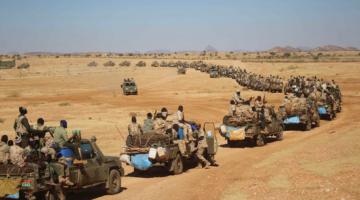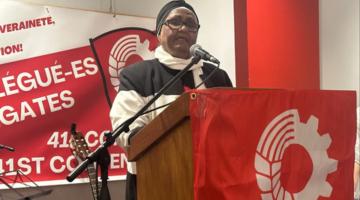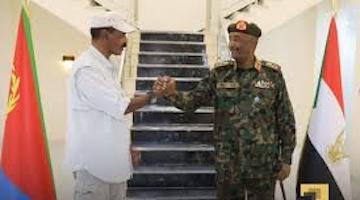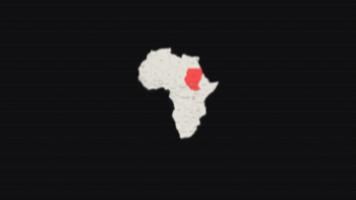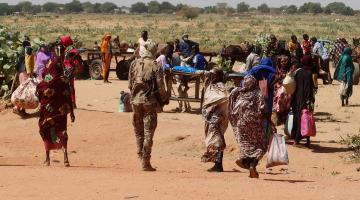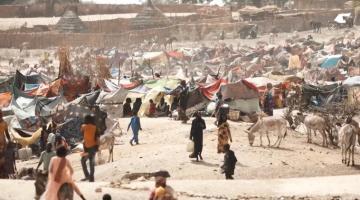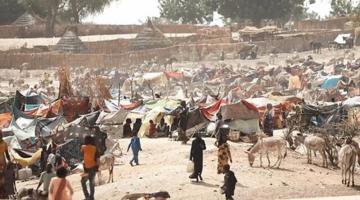Chairman of the Sovereignty Council of Sudan, Gen. Abdel Fattah Abdelrahman al-Burhan (L) and Deputy Chairman of the Sovereignty Council, Mohamed Hamdan Dagalo (R) in Khartoum, Sudan on September 22, 2021 (Photo: Mahmoud Hjaj/Anadolu Agency)
The battle between warring generals in Sudan must end with a return to civilian rule.
In Sudan, two rival security forces turned their guns on each other on April 15 after many months of tension between the two groups. On that date, Sudanese citizens were awakened by gunfire and explosions in the capital Khartoum. The Sudanese Armed forces were engaged in a fierce battle with a paramilitary known as Rapid Support Force in control of the military facilities, airport and streets in Khartoum.
At the center of the conflict are army chief Lt Gen Abdel Fattah al-Burhan and Mohamed Hamdan Dagalo, also known as Hemedti. Sudan's political and security crisis began in April 2019, following months of protests against the country's long-serving dictator, president Omar al-Bashir and the military seizing control of the country’s affairs.
Even after Bashir was gone, Sudanese civilians continued with their demonstrations demanding elections to be held and power be returned to the civilian government. Four months later, the military ceded power and agreed to a power-sharing agreement with civilians, leading the country to an election by the end of 2023.
The military led by Army Chief Lt Gen Abdel Fattah al-Burhan dissolved the government led by Prime Minister Abdalla Hamdok, replacing the power-sharing agreement. In November 2021, El-Burhan was sworn in as head of the new Sovereign Council and was sworn in November 2021 and Hemedti was his deputy.
The current disagreement between the Sudanese armed forces led by Burhan and the paramilitary force, the Rapid Support Force led by Hemedti, stems from how to conduct the transition from a military rule to a civilian government and also how the RSF can be incorporated into the army and the authority that should oversee the process. The army raised the alarm over a possible armed conflict after the RSF deployed troops in Khartoum and other parts of the country without the army's permission. The ongoing conflict in Sudan has raised fears of a full-fledged civil war and the spillover effects that could destabilize the entire region. Sudan's air force's power was crucial in the early stages of the conflict. The Rapid Support Forces (RSF) targeted airports across the country to ground Sudanese Armed Forces (SAF) air operations. While this tactic has only partially succeeded, the RSF's ability to mobilize soldiers from neighboring Chad makes defeating them in their tribal homeland of Darfur difficult.
The RSF's occupation of Khartoum's residential buildings has also complicated the conflict, as removing them from military installations could take weeks. The division and friction between the two powerful forces have been visible with each side coming up with parallel foreign trips and seeking the support of different countries to support their side. Hemedti rose to power in the 2000s when he was the head of Janjaweed, a militia group with its roots in the Darfur region. The militia is responsible for human rights violations in the region.
After Bashir's overthrow in 2019, Burhan inherited a complex military-security structure in Sudan, which included various shadowy state security and intelligence units and the semi-autonomous Rapid Support Forces (RSF). Sudan has a history of military coups, with around 35 incidents since 1956. This military involvement in the country's politics indicates that the army perceives itself as the protector of Sudan.
Power Games & Ideological differences
Burhan is Sudan's current head of state, and Hemedti is his deputy. The country is being destabilized by the armed conflict between the forces they lead. Both men deposed al-Bashir and disbanded the government led by civilian Prime Minister Hamdok in 2019. The two men battling for control of the country differed on the restructuring. Burhan prefers that the RSF, led by Hemedti, be brought under the control of the national army, but the force, composed of former Janjaweed militiamen, wishes to remain independent.
Burhan, an army commander at the time, and Hemedti, who led the Janjaweed militia, fought alongside each other against rebels in the Darfur region in the mid-2000s. In the end, the forces committed atrocities and violated human rights in the region.
The current clashes have spread to other areas, including Darfur, where two opposing forces are fighting for control of the region. The army launched airstrikes on RSF positions.
Significant clashes were reported in al-Fasher and Nyala in Darfur, el-Obeid in North Kordofan, and Kassala in Kassala State, according to the UN OCHA. Three aid workers were killed in Kebkabiya, North Darfur.
Burhan was trained as an army officer in Egypt which supported him in his bid to take control of the country. The RSF claimed to have detained 30 Egyptian soldiers who had surrendered who were later released. Cairo is concerned about the impact of RSF on the stability of neighboring states.
Hemedti has the support of Russia, Saudi Arabia, and the United Arab Emirates. The ruling council's deputy also traveled to Ethiopia and South Sudan to establish diplomatic ties with those countries.
Sudan is in the grip of a full-fledged war, with several countries attempting to exert influence and assert their authority through the army or the RSF. The RSF has worked along the borders of Chad, Egypt, and Libya to monitor the flow of camel traders, militia groups, and immigrants traveling to Europe via those routes.
Burhan is attempting to resurrect the deposed al-Bashir network to achieve his objectives and buy time. To that end, he is recruiting former National Congress Party officials who previously supported al-Bashir and individuals from various opposition sectors, including the anti-military Forces of Freedom and Change.
Despite these changes and political maneuverings, Burhan has yet to match al-Bashir's success in retaining the support of the elite, Islamists, generals, and other powerful groups. Burhan's deputy is regarded as an outsider in the country's military structures and a militia leader.
Hemedti has remained ambitious and aspires to become Sudan's most powerful person. Although Hemedti is not an Islamist, he has received their support. He believes a smaller, privatized state would be more beneficial.
Despite their efforts, Burhan and Hemedti have yet to gain sufficient power to become Sudan's president. Both generals have resorted to violence to achieve their objectives or expand their influence over the country's future.
Public Concern and Foreign Interference
The Sudanese public has been concerned about military rule and foreign government interference in the affairs of their country. The latest armed clashes have killed over 100 people and displaced tens of thousands.
Sudanese protesters know that external actors such as Saudi Arabia and the UAE will not assist them in addressing their concerns and the democratization of their country. They recognize that the primary motivation behind these countries' Sudan policy is maintaining the status quo and preventing democratic movements from gaining power.
Sudan is a significant player in this context, with the UAE supporting the Sudanese army and the RSF, which have shown no inclination toward democratization. During Sudan's involvement in the Saudi-led coalition fighting in Yemen, Hemeti's RSF played a crucial role alongside a Sudanese army contingent led by Burhan, then the ground forces chief of staff. The RSF allegedly received support through funds and weapons from Saudi Arabia and the UAE. Hemeti himself claimed at a press conference that he had set aside $350 million, obtained through his role in Yemen and gold mining in Sudan, to aid Sudan's financial situation.
The RSF's information operation, based in the UAE, complicates the conflict by potentially attracting external actors. The UAE's involvement in the competition could exacerbate regional tensions and increase the likelihood of a larger conflict.
Parallel Force Challenge
In Africa some armies receive military training and support from some western countries and gulf countries to help with the stabilization efforts in their country and in the region. Some of this training from foreign governments has been used to create division in the military and some of those trained have participated in coups in Mali and Burkina Faso. In Sudan, countries like UAE and Saudi Arabia have used the parallel armies and division between the national army and the RSF to put a government that favors their interests.
Sudan, a country of 45 million people, faces an uncertain future as the fighting rages on. The East African nation faces a similar fate like that of Yemen, where the effort to restructure the military after the overthrow of former president Ali Abdullah Saleh became a dangerous affair and the country descended into a civil war. The war in Yemen made the Saudi led coalition which UAE was part of, to join the war to protect what they called the transitional government from the Iran backed Houthi rebel group.
Somalia may face similar challenges if UAE succeeds in having its own Somali trained force that’s independent from the central government. Some politicians, clan elders and religious leaders have warned against having parallel troops in a country that’s reeling from more than three decades of war.
The Yemen war prompted the Saudi-led coalition, of which the UAE was a member, to join the fight to protect the weak transitional government of Abd Rabbo Mansour Hadi from the Iran-backed Houthi rebel group.
If the UAE is successful in establishing its own Somali-trained force independent of the central government, Somalia may face similar challenges. Some politicians, clan elders, and religious leaders have warned against having parallel troops in a country that is still reeling from the effects of the civil war.
Regional Impact
Sudan borders the Red Sea, the Horn of Africa and the Sahel region. Its location and agricultural resources have attracted the interest of some foreign countries, and the power play between powerful countries has made it difficult for the country to transition from military to civilian rule.
Some of Sudan's neighbors Chad, Ethiopia and South Sudan, have experienced internal conflicts exacerbating the situation in Sudan. The relationship between Sudan and its neighbor Ethiopia has been tense due to disputes over farmlands along their shared border.
The Janjaweed forces, which Hemedti led, consisted of armed fighters from Chad. His rise to power will encourage other militia groups to take on established militaries in their respective countries, especially Chad, which is facing similar political and security challenges like that of Sudan since the death of president Idriss Deby, who was killed in 2021 while fighting a rebel group in the north of the country.
Egypt has already been implicated in the conflict, with reports of Egyptian soldiers training with the SAF being apprehended by the RSF early in the conflict. Diplomats fear that Cairo is preparing to back the SAF, escalating the conflict and potentially attracting other regional powers. There have also been reports of tribal mobilization along Chad's and Sudan's borders, which could exacerbate the conflict and increase the risk of regional instability.
This suggests that the conflict may worsen, raising the prospect of a full-fledged civil war in Sudan. A conflict of this magnitude could have far-reaching consequences for the entire region, potentially involving neighboring countries and global powers.
Sudan’s Future
The Hemedti-led paramilitary attempted a coup on Saturday April 15, but the plot failed after it failed to seize control of the capital, where it had previously held some key positions. According to some sources, Hemedti's strategy was to defeat the army and establish himself as the country's leader with the help of Russia, Saudi Arabia, and the United Arab Emirates. The Saudi and UAE governments intend to expel all elements of the Muslim Brotherhood from the national army, who were recruited by al-Bashir.
If the war continues and there is no winner, Sudan faces a protracted conflict that could last years or decades. Sudan's national army and paramilitary forces face an uncertain future as they both fail to achieve their goals as soon as possible. They face a collapse, and each faction will develop its own life, and eventually, tribal alliances are formed.
A victory for Hemedti and his supporters would be dangerous for the region and weak states, and the war would spread to neighboring countries, particularly ethnic groups whose homelands border Sudan.
The army must defeat the RSF for the sake of Sudan and the region's future. That way, there can be stability and the transition to civilian rule can begin.
Dr. Abdiwahab Sheikh Abdisamad is a Somali Kenyan and Kenyan citizen. He is the Executive Director of the Institute for Horn of Africa Studies and a specialist in political science, conflict resolution, and rural development.

